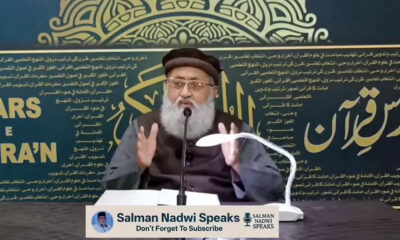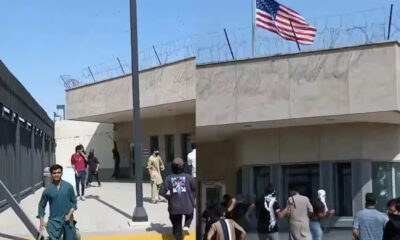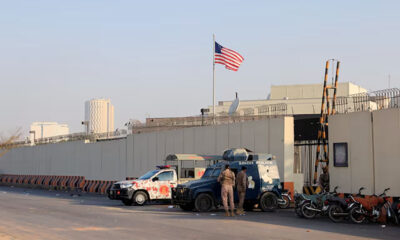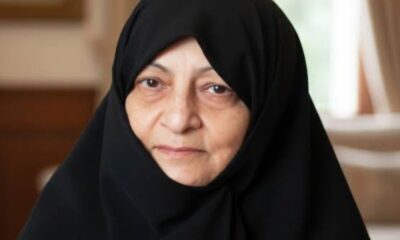World
Turkey’s Erdogan prevails in election test of his 20-year rule
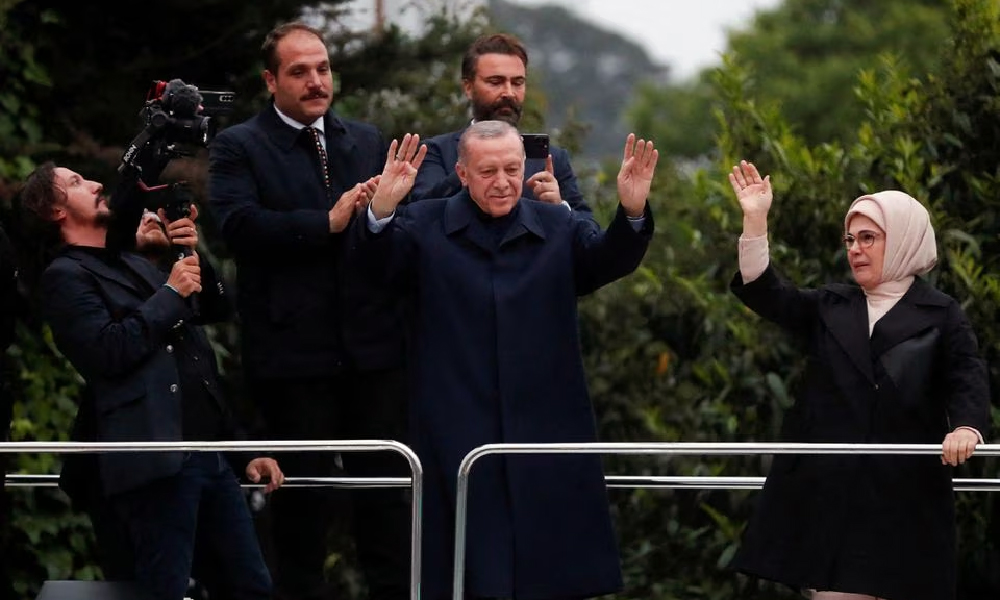
President Tayyip Erdogan extended his two decades in power in elections on Sunday, winning a mandate to pursue increasingly authoritarian policies which have polarised Turkey and strengthened its position as a regional military power, Reuters reported.
His challenger, Kemal Kilicdaroglu, called it “the most unfair election in years” but did not dispute the outcome.
Official results showed Kilicdaroglu won 47.9% of the votes to Erdogan’s 52.1%, pointing to a deeply divided nation.
The election had been seen as one of the most consequential yet for Turkey, with the opposition believing it had a strong chance of unseating Erdogan and reversing his policies after his popularity was hit by a cost-of-living crisis, read the report.
Instead, victory reinforced his image of invincibility, after he had already redrawn domestic, economic, security and foreign policy in the NATO member country of 85 million people.
The prospect of five more years of his rule was a major blow to opponents who accused him of undermining democracy as he amassed ever more power – a charge he denies.
In a victory speech in Ankara, Erdogan pledged to leave all disputes behind and unite behind national values and dreams but then switched gears, lashing out at the opposition and accusing Kilicdaroglu of siding with terrorists without providing evidence, Reuters reported.
He said releasing former pro-Kurdish party leader Selahattin Demirtas, whom he branded a “terrorist,” would not be possible under his governance.
Erdogan said inflation was Turkey’s most urgent issue.
Kilicdaroglu’s defeat will likely be mourned by Turkey’s NATO allies which have been alarmed by Erdogan’s ties to Russian President Vladimir Putin, who congratulated his “dear friend” on his victory, read the report.
U.S. President Joe Biden wrote on Twitter: “I look forward to continuing to work together as NATO Allies on bilateral issues and shared global challenges.”
U.S. relations with Turkey have been impeded by Erdogan’s objection to Sweden joining NATO as well as Ankara’s close relationship with Moscow and differences over Syria.
Addressing jubilant supporters earlier from atop a bus in Istanbul, Erdogan, 69, said “the only winner today is Turkey”. “I thank every single one of our people who once again gave us the responsibility to govern the country five more years,” he said.
Erdogan’s victory extends his tenure as the longest-serving leader since Mustafa Kemal Ataturk established modern Turkey from the ruins of the Ottoman Empire a century ago – a politically potent anniversary to be marked in October with Erdogan in charge.
Erdogan, head of the Islamist-rooted AK Party, appealed to voters with nationalist and conservative rhetoric during a divisive campaign that deflected attention from deep economic troubles.
In his victory speech, he attacked the opposition again, calling them pro-LGBT.
Kilicdaroglu, who had promised to set the country on a more democratic and collaborative path, said the vote showed people’s will to change an authoritarian government. “All the means of the state were laid at the feet of one man,” he said.
Erdogan supporters, who gathered outside his Istanbul residence, chanted Allahu Akbar, or God is Greatest.
“I expect everything to become better,” said Nisa, 28, a headscarved woman wearing a headband with Erdogan’s name.
Another Erdogan supporter said Turkey would get stronger with him in office for five more years.
“There are issues, problems in every country around the world, in European countries as well … With strong leadership we will overcome Turkey’s problems as well,” said the supporter who gave his name as Mert, 39, as he celebrated with his son.
Bugra Oztug, 24, who voted for Kilicdaroglu, blamed the opposition for failing to change. “I feel sad and disappointed but I am not hopeless. I still think there are people who can see the realities and truth,” Oztug said.
Erdogan’s performance has wrong-footed opponents who thought voters would punish him over the state’s initially slow response to devastating earthquakes in February, in which more than 50,000 people died, Reuters reported.
But in the first round of voting on May 14, which included parliamentary elections, his AK Party emerged top in 10 of the 11 provinces hit by the earthquakes, helping it to secure a parliamentary majority along with its allies.
French President Emmanuel Macron offered congratulations, saying France and Turkey had “huge challenges to face together”.
The presidents of Iran, Israel, and the Saudi king were among leaders to congratulate him in the Middle East, where Erdogan has asserted Turkish influence, at times with military power. Erdogan, who was for years at odds with numerous governments in the region, has taken a more conciliatory stance in recent years.
Emre Erdogan, a political science professor at Istanbul’s Bilgi University, attributed Erdogan’s success to his supporters’ belief “in his ability to solve problems, even though he created many of them”.
Erdogan had also maintained the support of conservative voters who long felt marginalised. “This era will be characterized by a decline in political and civil liberties, polarization, and cultural fights between two political tribes,” he said.
Erdogan appeared to have prevailed despite years of economic turmoil which critics blamed on unorthodox economic policies which the opposition had pledged to reverse.
Uncertainty about what an Erdogan win would mean for economic policy pushed the lira to record lows last week, Reuters reported.
Reuters reported last week that there was disagreement within Erdogan’s government over whether to stick with what some called an unsustainable economic programme or to abandon it.
Kilicdaroglu had promised to reset governance, restore human rights, and return independence to the courts and central bank after they were sidelined over the last decade.
World
US orders immediate evacuations across Middle East amid escalating conflict
Officials described “serious safety risks” following coordinated weekend strikes on Iranian targets and subsequent retaliatory operations.
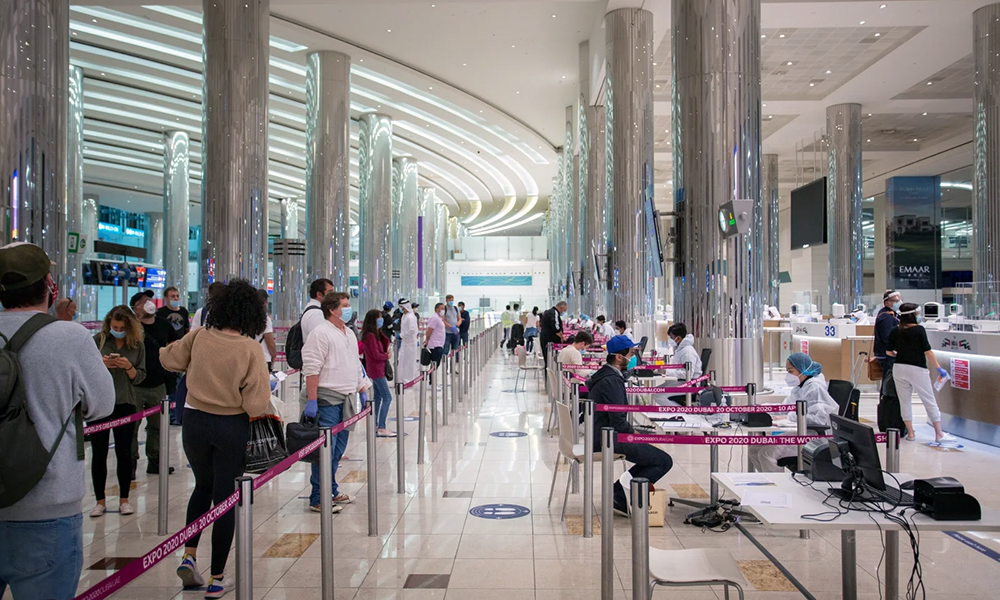
The U.S. Department of State has issued an extraordinary directive urging American citizens to immediately depart more than a dozen countries across the Middle East, citing rapidly deteriorating security conditions following joint U.S.-Israeli strikes that killed Iran’s Supreme Leader, Ayatollah Ali Khamenei.
The sweeping advisory comes as retaliatory attacks, embassy closures and major air travel disruptions fuel growing instability across the region.
U.S. officials say the move reflects Washington’s assessment that the crisis could become prolonged and highly volatile, with potential consequences for global security and energy markets.
Broad Regional Advisory
The evacuation notice covers 14 countries and territories, including close U.S. partners such as Israel, Saudi Arabia and the United Arab Emirates. It marks one of the most expansive regional security alerts in recent history.
Officials described “serious safety risks” following coordinated weekend strikes on Iranian targets and subsequent retaliatory operations.
Americans have been urged to leave using commercial flights while they remain available, rather than waiting for potential government-organized evacuations should conditions worsen.
From Targeted Strike to Regional Crisis
The evacuation order follows the killing of Khamenei in coordinated operations that reportedly also targeted other senior Iranian officials. Tehran’s response has included strikes on U.S. and Israeli-linked sites, as well as threats directed at Gulf states and key energy infrastructure.
Concerns have intensified over security in the Strait of Hormuz, a vital shipping route for global oil supplies. Rising tensions in the waterway have already driven up energy prices amid fears of further disruption.
The United States has activated an inter-agency emergency task force to manage the unfolding crisis. President Donald Trump indicated the confrontation could extend beyond a month, underscoring expectations of sustained instability.
International Appeals for Restraint
Global leaders have called for urgent de-escalation. European Commission President Ursula von der Leyen and United Nations Secretary-General António Guterres both urged restraint and renewed diplomatic engagement, warning of severe humanitarian and security consequences.
Russia and China condemned the strike that killed Khamenei as a breach of international law, while France pressed Iran to return to negotiations over its nuclear and ballistic missile programs. The European Union has placed its Red Sea naval mission on heightened alert to safeguard maritime routes amid fears of spillover attacks.
Guidance for U.S. Citizens
Americans in affected countries are advised to contact 24-hour State Department assistance lines and enroll in the Smart Traveler Enrollment Program (STEP) to receive updates. Officials stress the urgency of departing while commercial flights are still operating, as mounting airspace closures and cancellations have already left large numbers of travelers stranded.
Analysts warn that transport disruptions and security risks could persist for days or weeks, urging U.S. citizens to prepare contingency plans in case of extended regional instability.
World
Just one in four Americans supports US strikes on Iran, Reuters/Ipsos poll finds
The poll showed that 56% of Americans think Trump, who has also ordered strikes in Venezuela, Syria and Nigeria in recent months, is too willing to use military force to advance U.S. interests.

Only one in four Americans approves of the U.S. strikes that killed Iran’s leader, while about half — including one in four Republicans — believe President Donald Trump is too willing to use military force, according to a Reuters/Ipsos poll that concluded on Sunday.
Some 27% of respondents said they approved of the strikes, while 43% disapproved and 29% were not sure. About nine in 10 respondents said they had heard at least a little about the strikes, which began early on Saturday.
The poll showed that 56% of Americans think Trump, who has also ordered strikes in Venezuela, Syria and Nigeria in recent months, is too willing to use military force to advance U.S. interests. The vast majority of Democrats – 87% – held this view, as did 23% of Republicans and 60% of people who don’t identify with either political party.
The poll was conducted during the strikes on Iran by the U.S. and Israel, and closed before the U.S. military announced the first American casualties in the operation. Three U.S. service members have been killed and five more seriously wounded since the strikes, which plunged the Middle East into a new, unpredictable conflict.
While 55% of Republicans said they approved of the strikes and 13% disapproved, the Reuters/Ipsos poll found 42% in Trump’s party said they would be less likely to support the Iran campaign if it leads to “U.S. troops in the Middle East being killed or injured.”
Trump’s presidential approval rating ticked slightly lower to 39%, one percentage point below a Reuters/Ipsos poll conducted February 18-23.
The strikes on Iran began three days before the first primaries of the U.S. midterm elections, which will determine whether Trump’s Republicans maintain their majorities in Congress for the next two years. Reuters/Ipsos polls have consistently shown that voters’ top concern heading into the elections is the economy, far more than foreign affairs.
Some 45% of poll respondents, including 34% of Republicans and 44% of independents, said they would be less likely to support the campaign against Iran if gas or oil prices increased in the United States.
Prices for Brent crude surged 10% to about $80 a barrel in over-the-counter trade on Sunday, oil traders said. Analysts predicted prices could climb as high as $100 due to the latest conflict.
The most recent Reuters/Ipsos poll gathered responses online from 1,282 U.S. adults nationwide. It had a margin of error of three percentage points.
World
US lawmakers, world leaders react to death of Ayatollah Ali Khamenei after Iran strikes
The announcement drew praise from some lawmakers who have long opposed Tehran’s leadership, while others condemned the military action and questioned its legality.

Political leaders in the United States and around the world reacted sharply and along partisan lines after the reported death of Iran’s Supreme Leader, Ayatollah Ali Khamenei, following joint U.S.-Israeli strikes on Iran.
The announcement drew praise from some lawmakers who have long opposed Tehran’s leadership, while others condemned the military action and questioned its legality.
Representative Yassamin Ansari, the only Iranian American member of Congress, described Khamenei as the “epitome of evil,” saying no one should mourn his death. However, she cautioned that removing a single leader would not dismantle Iran’s political system.
“Military force alone will not secure a democratic future for the Iranian people,” she wrote on social media, warning that without a clear plan, the escalation could endanger U.S. troops and further destabilize the region.
Former Representative Marjorie Taylor Greene criticized President Donald Trump, arguing that the focus on Iran did not align with his “America First” agenda and diverted attention from domestic economic concerns.
Senator Bernie Sanders labeled the conflict a “Trump-Netanyahu war,” referring to Israeli Prime Minister Benjamin Netanyahu. Sanders said the action was unconstitutional and violated international law, urging Congress to pass a War Powers Resolution to limit further military involvement.
In contrast, Senator Lindsey Graham praised Trump’s leadership, saying he was proud of the administration’s actions and describing the president as setting a new standard for Republican foreign policy.
Reza Pahlavi, the exiled Iranian crown prince and son of the late Shah Mohammad Reza Pahlavi, declared that Khamenei had been “erased from the pages of history.” He said the Islamic Republic was nearing its end and called on Iranians to prepare for what he described as a decisive moment for change.
Ukraine’s official government social media account posted a brief message celebrating the death of a “dictator,” while Australian Prime Minister Anthony Albanese told reporters that Khamenei would not be mourned, citing his role in Iran’s missile and nuclear programs and the regime’s repression at home.
The sharply divided reactions underscore the high stakes of the escalating confrontation, as global leaders weigh the consequences of a direct strike that has dramatically reshaped the political landscape in Iran and across the Middle East.
-

 Latest News3 days ago
Latest News3 days agoPakistani military jet downed in Afghanistan’s Jalalabad, pilot captured alive
-

 Latest News4 days ago
Latest News4 days agoAfghan Air Force conducts airstrikes in Islamabad, other cities
-
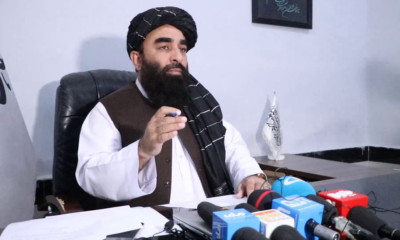
 Latest News4 days ago
Latest News4 days agoIEA: Special circle in Pakistan has launched mission to destabilize region
-

 Latest News1 day ago
Latest News1 day agoAfghan air force strikes key Pakistani military installations in retaliatory operation
-
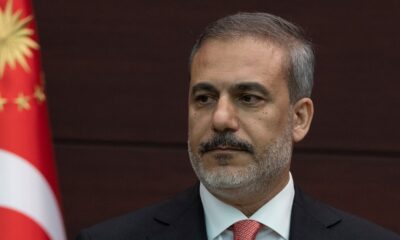
 Latest News4 days ago
Latest News4 days agoTurkey launches initiative to diffuse Afghanistan-Pakistan tension
-

 Regional5 days ago
Regional5 days agoNarendra Modi holds high-level talks after historic address to Knesset
-

 Latest News4 days ago
Latest News4 days agoAfghans say they are united against Pakistan aggression
-
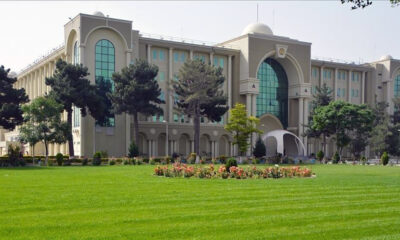
 Latest News3 days ago
Latest News3 days agoAfghan forces conduct fresh airstrikes on Pakistani military targets


